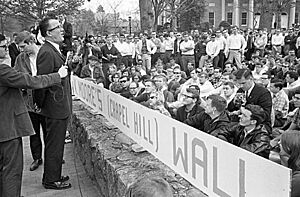Frank Wilkinson facts for kids
Frank Wilkinson (born August 16, 1914 – died January 2, 2006) was an American activist who worked to protect civil liberties. He was a leader of groups like the National Committee Against Repressive Legislation. These groups later became the Defending Dissent Foundation.
Contents
Frank Wilkinson's Early Life
Frank Wilkinson was born in Charlevoix, Michigan. He was one of four children. His family moved to Hollywood, California, in 1925. Two years later, they moved to Beverly Hills. Frank said he was not affected by the Great Depression because his family was comfortable. He went to Beverly Hills High School.
Frank graduated from the University of California, Los Angeles in 1936.
After college, Frank traveled around the U.S., North Africa, and the Middle East. He visited Hull House in Chicago, which was a place that helped people in need. While there, he saw Maxwell Street and realized how much poverty existed. This was a big moment for him. He saw more poverty in New York City and during his travels abroad. These experiences made him think differently about the world and his beliefs.
Why the FBI Watched Frank
When Frank came home, he told his family about his new ideas for social change. The FBI became interested in him. They started a file on him because he was seen with people they considered "known Communists." The FBI watched Frank's activities for the next 40 years.
Frank met Msgr. Thomas O'Dwyer, who worked with Catholic charities. He showed Frank poor areas near his home in Beverly Hills. Frank then joined a group called the Citizens Housing Council. This group worked to clear slums and build public housing. Frank later joined the staff of the Los Angeles Housing Authority.
At the Housing Authority, Frank worked to make sure the first Watts Housing project was open to everyone, no matter their background. He became the manager and helped make this happen. He also explained the housing plans to many different groups. This included veterans, religious leaders, and community groups.
Chavez Ravine and Public Housing
Frank Wilkinson became involved in the McCarthy Era. This was a time when many people were accused of being disloyal to the U.S. government. Frank was defending a large public housing project called Elysian Park Heights. This project was planned for the Chavez Ravine area of Los Angeles. Many people living there had to move because of the new construction.
In 1952, Frank was asked to speak in court about the conditions in Chavez Ravine. He said the area had very poor, "slum-like" conditions. A lawyer for the landowners asked Frank about all the groups he had joined. Frank listed many groups, but he refused to answer if that was all. He said it was a "matter of personal conscience."
Because he refused to answer, the court said he could not be an expert witness. The Los Angeles City Council then asked the House Un-American Activities Committee (HUAC) to investigate the Housing Authority.
Frank and his wife, Jean, were called to a closed meeting by a California Senate committee. They both refused to answer questions about their political groups. They were both fired right away. The housing program then stopped, and Dodger Stadium was built in Chavez Ravine instead.
Fighting Against HUAC
Frank Wilkinson was called before the House Un-American Activities Committee (HUAC) two times. He appeared in Los Angeles in 1956 and in Atlanta in 1958. Both times, he used his First Amendment right to free speech and refused to answer their questions. He was found guilty of contempt of Congress. His case went all the way to the Supreme Court. The court upheld his conviction.
While his case was in court, Frank traveled across the country. He spoke out against HUAC and helped organize protests. In 1960, he helped create the National Committee to Abolish HUAC. This group later became the National Committee Against Repressive Legislation. Frank led this organization until he died.
On May 1, 1961, Frank Wilkinson went to federal prison.
Frank's Large FBI File
After he was released from prison, Frank continued his work to get rid of HUAC. He traveled and spoke at colleges and meetings. The FBI continued to watch him very closely during this time.
In 1986, Frank sued to get his FBI file. With help from the American Civil Liberties Union, the FBI had to release 132,000 pages of files about him. These files included reports on his speeches and travels.
Awards and Recognition
Frank Wilkinson received several awards for his work against political repression. These include:
- The Roger Baldwin Medal of Liberty
- The American Civil Liberties Union Eason Monroe Courageous Advocate Award
- The Earl Warren Civil Liberties Award
- The 1997 National Lawyers’ Guild Legal Worker of the Year award
His story was also featured in a special edition of Life (magazine) in 1991. This issue celebrated the 200th anniversary of the Bill of Rights.
Films and Music About Frank
Frank Wilkinson is featured in several films:
- Operation Abolition (a propaganda film made by HUAC, Frank is interviewed starting at minute 38)
- The Un-Americans (a BBC documentary)
- The Price of Freedom (narrated by Ed Asner)
He is also mentioned in Ry Cooder's song Don't Call me Red.
Images for kids
-
Frank Wilkinson addressing crowd on March 2, 1966 from property within the town of Chapel Hill over the stone wall (property line) of the University of North Carolina at Chapel Hill after the university's refusal to allow Herbert Aptheker and himself to speak to students that invited them to campus.
 | Bessie Coleman |
 | Spann Watson |
 | Jill E. Brown |
 | Sherman W. White |



